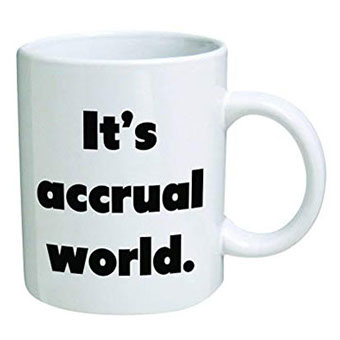What is Accrual Accounting?
What is Accrual Accounting and How Does it Effect my Small Business Bookkeeping in Surrey BC
An accrual basis of accounting records revenue at the point that it has been earned (not when received), and expenses when incurred (not when paid). In contrast, the cash basis of accounting records revenues when received in cash, and expenses only when actually paid.
Let’s say you are a maintenance company providing services to a townhome development for upgrades to their parking lot. On September 15th you complete the job for the client and process an invoice for services rendered. On September 29th your customer issues a cheque, which you receive and deposit into the bank on September 31st.
Under the cash basis of accounting method, you would recognize the revenue for this sale on September 29th, when the cash is received. Under the accrual basis method, you would recognize the revenue for this sale on September 15th, when you issued the invoice. You can see that when transactions occur during the same month or tax year, the difference between the two methods may not seem important. However, the impact is more evident around the end of the tax year because the method your business uses would determine which tax year you would record revenues and expenses.
Accrual accounting provides an accurate picture of income and expenses attached to that income by “matching” the income earned with the expenses when incurred.
The Matching Concept

The “matching” principle under GAAP (Generally Accepted Accounting Principles) is central to the issue of determining profit from a business. The matching concept can be viewed as the method by which revenues and expenses relating to the realization of those revenues are “matched” for the particular period in question, in order to properly measure the profit or loss from a business for that period.
In many businesses, revenue under the accrual basis of accounting will be at the point of invoicing. At that point, revenue will be recorded and an offsetting receivable will be set up in the accounts of the corporation. Expenses are recorded when there is a legal liability to pay an amount. This would occur upon the receipt of an invoice or bill from a supplier, but it might also be appropriate to accrue expenses for amounts or outlays incurred, but for which no invoice has yet been issued.
Why is This Relevant
 If you are attempting to prepare the annual T2 Return, but it appears that the company’s accounts are prepared only on a cash basis, this should be a warning or indicator that there are significant issues which will prevent the T2 from being properly prepared.
If you are attempting to prepare the annual T2 Return, but it appears that the company’s accounts are prepared only on a cash basis, this should be a warning or indicator that there are significant issues which will prevent the T2 from being properly prepared.
Reality is that many small businesses record their inflows and outflows on a cash basis. This results in the bookkeeper, or accountant adjusting the books and records of the corporation at the fiscal year-end to accrual accounting.
To determine the most appropriate method for your company depends on your sales volume, whether or not you sell on credit and your overall business structure. We can assist with helping you determine which is the best method for you small business in White Rock or Surrey BC.
At Green Quarter Consulting - Accounting and Bookkeeping Services for White Rock, South Surrey, Langley and Surrey BC, we are here to help. We can assist with guiding you through some of the Advantages and Disadvantages of Accrual Accounting versus Cash Accounting for your Small Business.
Contact us today at 778-791-2864 or 604-970-0658, let’s talk, or send us an email here and we will be in touch very shortly.
GET YOUR FREE CONSULTATION TODAY

